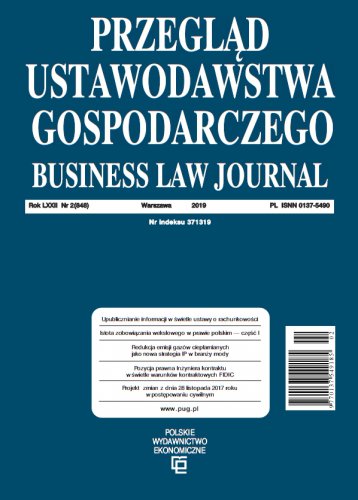Admissibility of imposing a fine on the concessionaire for failure to comply with the obligation resulting from the concession. Critical commentary to the resolution of the Supreme Court of 9 July 2019 (I NSZP 1/19)
The subject of the gloss is a critical assessment of the resolution of the Supreme Court of July 9, 2019 (I NSZP 1/19). In the voted verdict, the Supreme Court accepted that the legislator provided for 56 sec. 1 point 12 Energy Law Act the sanction is of an administrative nature and its primary purpose is prevention. The Supreme Court also indicated that, in its opinion, the correct interpretation of the above-mentioned legal norm leads to the conclusion that imposing a fine on the concessionaire for failure to comply with the obligation arising from the concession is permissible also when this obligation arises not only (directly) from the content of the administrative decision itself, but also in a situation where it can be reconstructed from generally applicable law regulations related to licensed activities. In the opinion of the authors, these theses require in-depth, critical reflection — both in terms of erroneous and too superficial identification of the function (goal) of the above-mentioned sanctions with administrative prevention, and as to the questionable interpretation of the concept of ''the obligation arising from the concession''.
References
Bibliografia/References
Literatura/Literature
Jaworowicz-Rudolf, A. (2012). Funkcje sankcji administracyjnej i odpowiedzialności administracyjnej w ochronie środowiska. Warszawa.
Klat-Wiertelecka, L. (2011). Sankcja egzekucyjna w administracji a kara administracyjna. W: M. Stahl, R. Lewicka, M. Lewicki (red.), Sankcje administracyjne. Blaski i cienie. Warszawa: Wolters Kluwer.
Niżnik-Dobosz, I. (2011). Aksjologia sankcji w prawie administracyjnym W: M. Stahl, R. Lewicka, M. Lewicki (red.), Sankcje administracyjne. Blaski i cienie. Warszawa: Wolters Kluwer.
Sarnecki, P. (1999). Nota do art. 144. W: L. Garlicki (red.), Konstytucja Rzeczypospolitej Polskiej. Komentarz. Tom I. Warszawa: Wydawnictwo Sejmowe.
Wincenciak, M. (2008). Sankcje w prawie administracyjnym i procedura ich wymierzania. Warszawa: Wolters Kluwer.
Wróbel, W. (2016). Komentarz do art. 53 k.k. W: W. Wróbel, A. Zoll (red.), Kodeks karny. Część ogólna. Tom I. Część II. Komentarz do art. 53–116. Lex.
Orzecznictwo/Judgments
Wyrok Trybunału Konstytucyjnego z 20.04.2004 r., sygn. K 45/02, OTK-A 2004/4/30;
Wyrok Sądu Najwyższego z 6.10.2011 r., sygn. III SK 18/11, LEX nr 1108488.
Inne źródła/Other sources
Uzasadnienie projektu ustawy o zmianie ustawy — Kodeks postępowania administracyjnego oraz niektórych innych ustaw, Kadencja VIII, druk 1183, https://www.sejm.gov.pl/sejm8.nsf/PrzebiegProc.xsp?nr=1183

